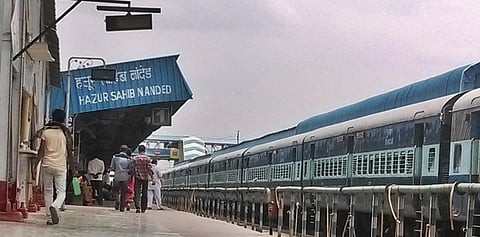Bullet train or safe sanitation: Tough choice for Nanded
On June 18, 2021, Public Works Department (PWD) Minister of Maharashtra, Ashok Chavan demanded that the proposed bullet train between Mumbai and Hyderabad should pass through Nanded, in the Marathwada region of the state.
Around the same time, a research study by the Centre for Science and Environment (CSE), New Delhi, showed that only 45 per cent of Nanded’s wastewater is treated safely.
This poses a question about what sort of development Nanded needs at the moment and what should be given priority: speed or public health.
Nanded, which is not only a historic city but also an important economic hub in Marathwada, suffers a great deal due to sanitation problems. the Nanded Waghala City Municipal Corporation (NWCMC) was certified at one-time as ODF+ and ODF++ (Open-defecation free).
However, the city administration treats only 45 per cent of its wastewater while the remaining 55 per cent has been found to be untreated. Even with a sewerage cover of 95 per cent across the city, it experiences major sewer blockages throughout the year.
A shit flow diagram of Nanded shows that 57 per cent of its households are connected to open drains that are considered unsafe due to the possibility of transmission of pathogens to the public, thereby impacting their health.
According to Environmentalist Foundation of India’s (EFI) limnology report of the Godavari River Basin in Nanded, thousands of fish were found dead on the river’s banks during the nationwide lockdown (June-2020). The report mentions the diversion of 18 drainages which caused the death of the fish.
According to strategic suggestions given to the Nanded City Development Plans (2006), the city has managed to extend its sewerage network from 425 km to 986 km.
However, despite this, sewage discharge into the Godavari remains a big issue for NWCMC. EFI’s report states: “Despite huge funds received from the central government being spent, there have been no improvements in the river body system since 2008.”
The Shit Flow Diagram too shows that there are issues in the wastewater conveyance systems. Despite this, the NWCMC is focusing on constructing sewage treatment plants (STPs) such as the Chunnal Nala STP in the city.
Ashok Chavan, PWD minister of Maharashtra, who is also a resident of Nanded, demanded through a letter to Chief Minister Uddhav Thackeray that the state should ask the Centre to take the bullet train route from Aurangabad, Jalna and Nanded up to Hyderabad. He wrote:
The National High Speed Rail Corporation Ltd is working to setup a bullet train corridor between Mumbai and Hyderabad via Pune and Solapur. But Marathwada is not getting its due, as per this plan. For the Mumbai-Hyderabad bullet train, a route through Aurangabad-Jalna-Nanded is also available. Therefore, the state must immediately send a proposal to the Centre to alter the route.
“I have made the request to the chief minister yesterday that no additional land acquisition cost will be required for the bullet train and the alignment for the bullet train should be adjoined to Samruddhi Mahamarg,” Chavan told the Maharashtra Times.
The Samruddhi Mahamarg has been already allocated Rs 7,000 crore for the Nanded-Jalna Expressway connector which will connect Nanded city with the 701-km Mumbai-Nagpur Samruddhi Mahamarg (Expressway). However, the question arises as to what will be the cost of this bullet train excluding the land acquisition?
When Nanded already lacks the basic infrastructure of sanitation, what is more important for the city at present? Is it really ready to gets it bullet train or is there a dire need for government interventions to improve Nanded’s sanitation?
Abhijit Waghre is an Urban Fellow at Indian Institute for Human Settlements, Bangalore. Author would like to thank Rekha Raghunathan (Lead – Word Lab and Library, IIHS) for editing the article
Views expressed are the author’s own and don’t necessarily reflect those of Down To Earth

